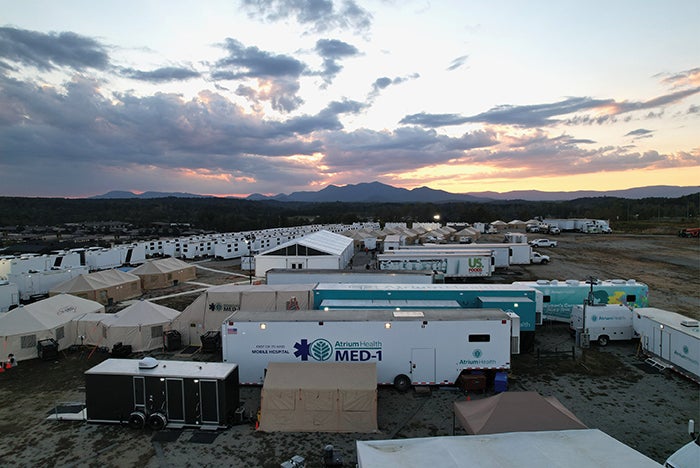Mobile units expedite post-hurricane care

Atrium Health deployed MED-1, its mobile hospital operating unit, to Tryon, N.C., following Hurricane Helene.
Image courtesy of Atrium Health
In September 2024, Hurricane Helene’s record-breaking rainfall damaged thousands of miles of road across North Carolina and neighboring states, making health care difficult to access for millions of people. In response, Charlotte, N.C.-based Advocate Health deployed air- and ground-based health care services to reach communities in the regions of North Carolina most impacted by the storm.
The health system notes in a new report, “The Vital Role of Large Health Systems in Disaster Recovery,” that a decentralized control structure enabled the rapid decision-making that allowed teams to most effectively provide care.
Atrium Health MedCenter Air and Wake Forest Baptist AirCare — operated by Advocate’s southeast care delivery brand, Atrium Health — used helicopters and ground ambulances to move patients from overstressed facilities and to specialty care as needed. Use of satellite communications equipment allowed paramedics to connect with hospital-at-home physicians to provide patient care, help secure needed medications and coordinate evacuations.
Impacted hospitals used a statewide online system established after the COVID-19 pandemic to take the burden of coordinating transfers off hospitals overwhelmed by the storm. Rather than calling around to see who had availability to take patients, staff could simply list patients in need of evacuation for nearby hospitals to accept. The Atrium Health Wake Forest Baptist Regional Operations Center and Charlotte Capacity Command Center facilitated coordination of patient transfers following the storm. In another step to ease the burden on local hospitals, Atrium Health mobilized its MED-1 mobile hospital operating unit. The self-sustaining “emergency department on wheels” brought 14 acute-care beds and a two-bed operating room — as well as pharmacy, imaging and lab services — to Tryon, a town within the remote area of southwestern North Carolina severely impacted by Helene. The on-site team of clinicians and support staff provided transitional care to 116 patients over 12 days. The site also provided a central location for Advocate’s team to meet daily with federal partners.
Because the various mobile crews did not have to wait for approvals from incident command, they could more readily pivot in response to local needs. For example, helicopter crews that were deployed to pick up patients identified that many of those patients were simply in need of critical supplies, prompting the team to dedicate a helicopter to transport essential supplies instead. Crews provided a total of 14,500 pounds of critical resources to many residents in western North Carolina.




